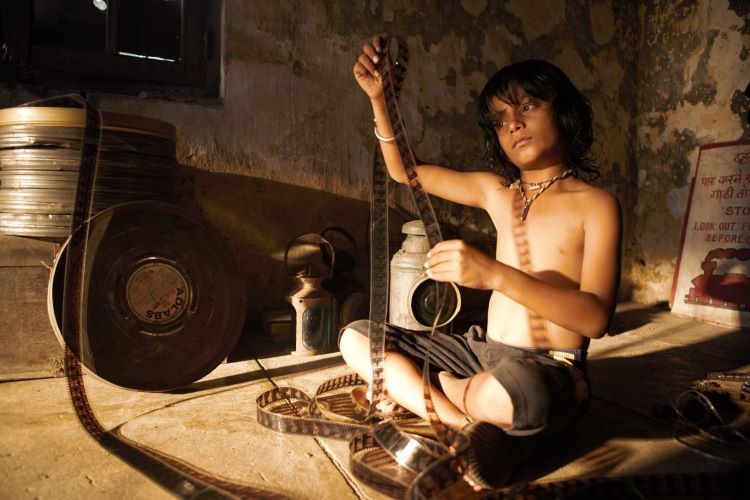
Pan Nalin’s Last Film Show is a love song to film – not only the movies, but the tangible artifacts of the way all films used to be made – the film, the splicers, and the projectors, all objects you can touch, and the magical quality of light. It is also an ode to the kind of childhood that children in many parts of the world no longer experience, a childhood spent almost entirely outdoors, alone or with other children, left to one’s own imagination to create diversions. Last, but not least, it is an homage to over a century of innovators and filmmakers, from the Lumiere Brothers to Stanley Kubrick, and the art of preparing a delicious meal.
Samay (Bhavin Rabari) is a nine-year-old boy living a simple life with his family in a remote part of Gujarat, a state on the Western coast of India. His father (Dipen Raval) has a tea stand by the Chalala train station, where hardly anyone gets off the train, and the family barely ekes out a living. Yet Samay’s mother (Richa Meena) prepares and packs Samay’s lunch with loving care, great skill, and an eye for color. Inquisitive and resourceful, Samay is accustomed to creating his own amusements. He collects discarded objects – nails, matchboxes, shards of glass and finds ways to use them, like placing nails on the train track to be flattened into arrowheads. Samay’s life changes on the day his father takes the family into the next town to see a movie. Although his father disapproves of the film industry, an exception will be made since the film in question is religious, yet he warns Samay that this will be the first and last film he sees. But Samay is entranced, as fascinated by the light coming from the projector as he is by the film he sees unfolding before him on the screen.
Young Bhavin Rabari carries the weight of the film so lightly, bringing the character of Samay to vivid life with ease and the natural rhythms of childhood. The viewer sees Samay’s thoughts and feelings in his gaze, and like his band of friends, is drawn into the adventure. The entire cast delivers solid and appealing performances. Dipen Raval, as Samay’s father, depicts a man whose rigidity and sternness are the result of a lifetime of disappointment, a man who thinks he knows what is best for his son, and makes a sincere, if sometimes misguided effort. Richa Meena is Samay’s quiet yet caring mother, her feelings are expressed through the work of her hands and her sometimes worried, yet loving, gaze. Beyond his family, Samay is fortunate to have a teacher (Alpesh Tank) who is concerned about the wellbeing of his students and gives Samay good advice. In Fazal (Bhavesh Shrimali) the projectionist at the Galaxy movie theatre, Samay finds a mentor and ally, and Shrimali brings a lively, playful quality to his performance.
Samay’s name means time, and movies are made of time, light, and stories. The film is set in 2010, just as 35mm projection is about to be displaced by digital filmmaking. Samay’s experiences reflect those of Pan Nalin, who grew up in a remote village in Gujarat. He too helped his father sell tea on the railway platform, and he too fell in love with film. Samay is determined to see as many movies as he possibly can, despite his father’s objection, and despite having no money for tickets. He is also intent on figuring out how it all works, how to capture the light that makes the images appear on the screen. Although the film tells a realistic, semi-autobiographical story, its storytelling is imaginatively visual, filmed in rich, saturated, bright hues and conveying a sense of Samay’s inner world and experiences. In one of the film’s most beautiful scenes, Samay and his friends look at light, observing and playing, capturing the wonder of childhood and discovery.
Last Film Show (Chhello Show)
US/FR/IN/2022/110 min/Gujarati with Hebrew subtitles
Written and directed by Pan Nalin; Cinematography: Swapnil S. Sonawane; Editors: Shreyas Beltangdy, Pavan Bhat; Music: Cyril Morin; Cast: Bhavin Rabari, Bhavesh Shrimali, Richa Meena, Dipen Raval, Alpesh Tank





